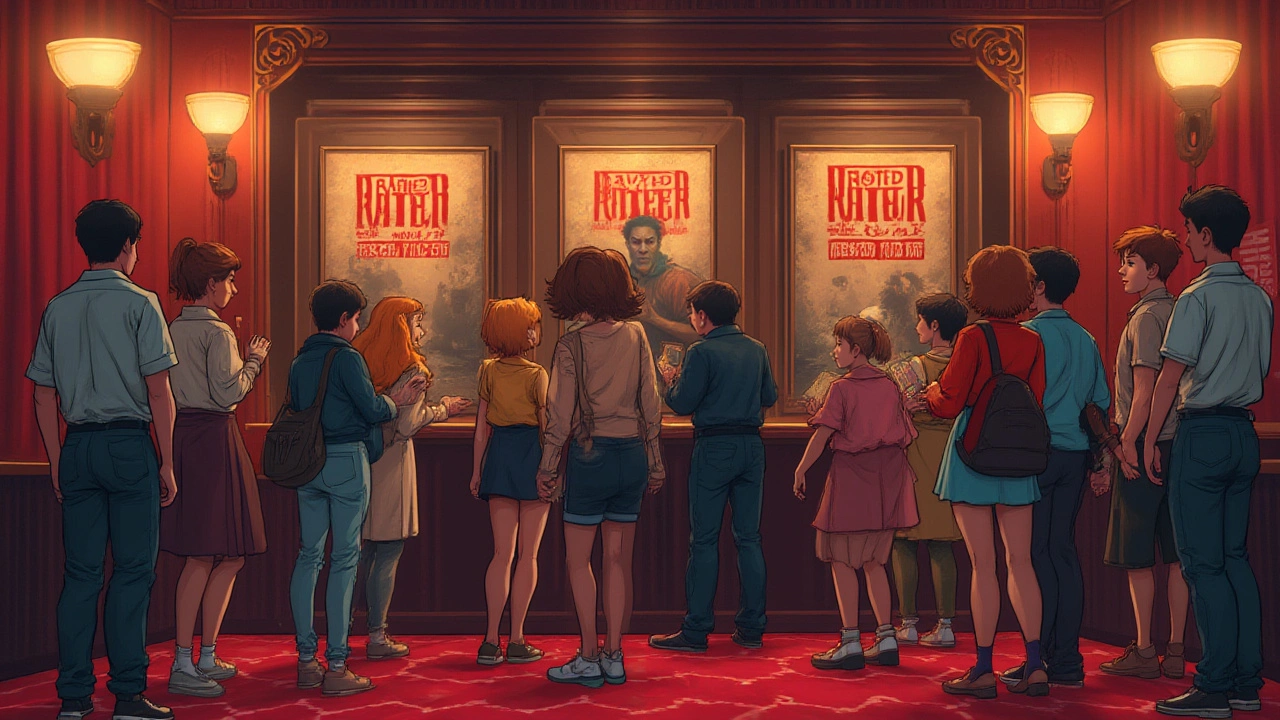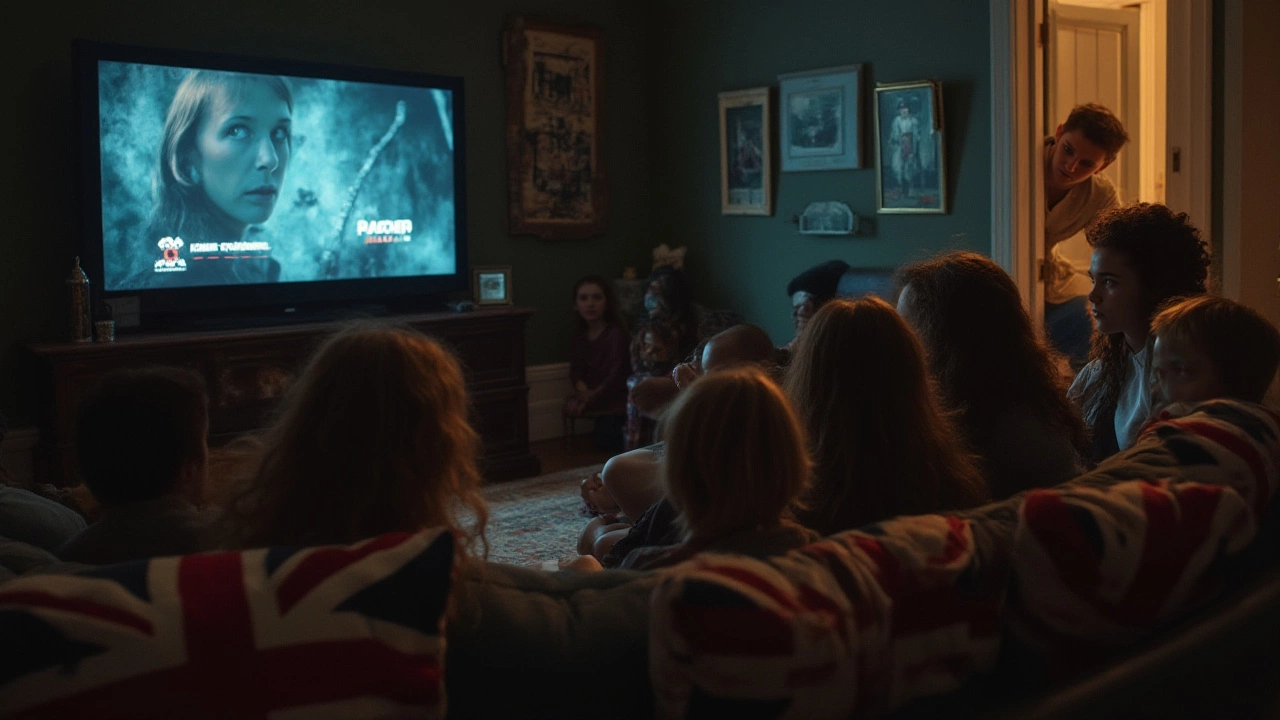Picture your typical Friday night: popcorn in hand, lights dimmed, movie queued up, and then that familiar red "R" flashes across the screen. In that moment, if you're under 17 (or a parent of a curious kid), a million-dollar question often pops up: Is it actually illegal to watch a rated R movie if you're not old enough?
Most people have a tale from middle school or their first "edgy" sleepover featuring a horror flick that, technically, wasn’t meant for everyone in the room. Some parents get super-strict about this sort of thing; others barely blink. Yet, the rules behind that little "R" on the corner of your movie are a lot more interesting than many realize. You’d think it’s all written in stone—but grab your seat, because the truth is a lot weirder.
The Real Meaning of Rated R: What the Rules Say
So—rated R. What does it even mean? The Motion Picture Association (MPA) slaps an R rating on films containing "adult material" like heavy language, strong violence, drug use, or nudity. Now, here’s the part that often stirs up confusion: The official rating says anyone under 17 must be accompanied by a parent or adult guardian to see the movie in theaters.
This guidance isn’t actually the law; it’s just an industry rule. That means movie theaters are the gatekeepers here. They’ll check IDs when you try to buy a ticket for an R-rated movie if you look young. Some chains, like AMC or Regal, even threaten to throw out groups of teens who try to sneak in.
But what about at home, watching a DVD or streaming on Netflix? Well, no one’s barging in to arrest you. Watching a rated R movie underage is not a crime. There are zero federal—or even state—laws that actually punish a minor for seeing (or a parent for allowing) an R-rated film.
The R, after all, stands for "Restricted," not "illegal." The MPA, which controls the ratings, is not a government body. It's a private organization, and its ratings are essentially recommendations, meant to guide parents and help theaters decide admission policies. This is a system that relies mostly on social contracts and house rules, not handcuffs.
What’s the point of all this then? For one, the ratings give parents a heads-up about what to expect from a movie. There's a trust that if something's labeled "R," there's stuff in there you might not want your ten-year-old to see. But the federal government? Not involved at all. There’s no national movie police (unless you’re running a sketchy bootleg theater, but that’s a different story).
| Rated R Rule | Enforcer | Legal Penalty? |
|---|---|---|
| Under 17 must be with parent/adult in theaters | Theater staff | No |
| Streaming or home viewing under 17 | Parents/Guardians | No |
Where Things Get Murky: State and Local Differences
Alright, so the feds aren’t worried about kids watching R-rated flicks. But what about your home state or city? Turns out, even on the local level, laws about movie ratings are almost nonexistent in the US. Most states never touch the subject—movie ratings are considered a free speech issue, protected thanks to a couple of Supreme Court rulings in the 20th century.
That doesn’t mean there are never any rules. There are rare, local ordinances—think super-small towns or cities—that try to ban minors from seeing certain movies in theaters without an adult. But that's more about ticket sales and physical attendance than what happens in someone’s living room. If you buy a ticket for an R-rated movie at a multiplex in 2025 and you’re 12, it’s the theater’s headache, not the law’s. At worst, you’ll just get denied at the box office or have to watch something G-rated instead.
Now, there’s a twist: If a parent drops kids off or gives permission to buy tickets, most theaters will accept that, sometimes after a phone call or signed note. But the law itself still isn’t involved. In private homes, parents can play whatever movie they want. There’s no legal age floor. Curious nine-year-old? Wild, but perfectly legal as far as the cops or courts are concerned. Social judgment? Maybe, but no handcuffs.
Interestingly, a few countries outside the US are way stricter. For example, in the UK, the British Board of Film Classification (BBFC) rating schemes have more teeth—cinemas can actually get fined for letting underage viewers into certain films. But in the US, the "R" is still all about theater policies, not lawbooks.
You might hear stories about random towns in the Midwest with rules against kids sneaking into horror nights at the local movie house. Even then, the punishment is usually just a warning, or the teen being escorted out and told not to come back without Mom or Dad. As a practical matter, police almost never get involved unless someone’s causing real trouble.

The Role of Parents, Streaming Platforms, and Technology
Let’s talk tech. Things have changed massively in the last two decades. Back in the day, parents only had to worry about what their kids saw at a multiplex or rented from Blockbuster. Now, with every streaming platform under the sun, managing who watches what is a whole new ballgame.
Netflix, Hulu, Prime Video, and Disney+ all have parental control settings. Some streamers let you set up profiles that block mature content unless a password is entered. According to a 2024 Pew Research Center study, 81% of US parents with kids under 16 have used some form of streaming parental controls at least once. Still, enforcement depends entirely on the people in the household—and how smart or sneaky the kids are.
Let’s be real: kids are clever. Ask any parent, including mine or my wife Althea, and you’ll get stories. We’ve had more than one night of peace ruined by a startled shriek from the living room, followed by a sheepish confession that our youngest accidentally watched something far scarier than she expected. We didn’t call the police—we just changed the password and had a talk.
Parental guidance is always the fallback. If you’re under 17 and desperate to see a forbidden zombie flick, most households still expect you to ask first. Some parents care a lot about ratings; others shrug and press play. The government stays out of it. The only exceptions are if the content crosses into illegal territory—think actual criminal conduct on camera, which is a whole different (and much more serious) ballgame.
- Parental controls: Set them up on all major streaming platforms.
- Check device settings, as phones and smart TVs also offer ways to block or filter explicit content.
- Have the "what is appropriate?" conversation early and often. Kids and teens are more likely to be open if you’re honest about why some things might be off-limits.
- Don’t panic if your child sees something "R" by mistake. Have a chat, not a meltdown.
Fun fact: 14% of parents in the US, according to a 2023 Gallup poll, have watched their child’s first R-rated film together as a sort of "rite of passage" between ages 12–14. That’s not a rebellion—it’s just life in the streaming age.
The Real-World Consequences—And Myths to Ignore
Maybe you’ve heard horror stories about movie theater "bans" or dire warnings about the law barging into your living room. Honestly, they’re mostly urban legend. Most theaters do have bans: if you try sneaking into an R-rated show and get caught, they may kick you out or refuse all future sales. Some places, if you act up or lie to staff, have polices to keep you off the premises for a week—or longer if you get mouthy with the manager. But police? Lawyers? Not part of the picture.
The real "consequences" for watching a rated R film too young are social, not legal. Parents may be embarrassed or upset. Maybe you have a few tough nights trying to sleep after watching your first slasher flick. You might even miss the best jokes because you’re too young to get them. But a criminal record? Zero chance.
There are, of course, exceptions for movie theaters that sell tickets to clear minors without checking IDs. If a local ordinance exists (and that’s rare), the theater might get fined—not the movie watchers. Most chains avoid the risk by being strict with their ticketing.
Curious how different states view this issue? Here’s a quick comparison of real cinema policies:
| State | Theater Policy Example | State Law? |
|---|---|---|
| California | AMC, Regal require age verification for R-rated tickets, no legal penalty for underage viewers | No |
| Texas | Some theaters require parent to purchase tickets in person for those under 17 | No |
| New York | Strict age-checking, but law does not mandate penalties | No |
So where did the myth of it being "illegal" come from? Probably a mix of overzealous adults, urban myths, and a sprinkle of good-old-fashioned playground telephone. If you dig into cases or news headlines about teens getting busted for horror night, you’ll just find stories about ejections, not lawsuits.
If you’re wondering about other countries? Places like Germany, Japan, and the UK all have laws with more teeth. There are real fines for ticket-sellers who let underage moviegoers sneak in, and sometimes even rules against home viewing by minors. But in the US, the "R" in "Rated R" will always stand for "Restricted," not "illegal" —unless you open a pirated movie theater in your garage. Then you’ve got a whole other problem.
The bottom line is simple: the rules around watching rated R movies are all about guidance and suggestions, not jail time or courtrooms. If you watch an R-rated movie before you’re old enough, the most that’ll happen is a stern talking-to, a hard eye roll, or a slightly awkward conversation with your parents. And that’s probably the way it should be.







